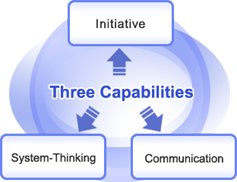

Three Capabilities
You will of course develop your expertise in the laboratory, but the required knowledge and skills will change over time or according to your role (position). For example, knowledge and skills that will be required 20 years after you start your career will be different from those required now. Therefore, more important are a broad knowledge for acquiring new knowledge and skills when they are required, a procedure for handling issues to be solved, and a will to do so. It is also important to have experiences that make you think that you can overcome difficulties because you will encounter various problems in your long life. Therefore, I would like to create an environment for you to cultivate the following capabilities through research-focused activities in the laboratory:

- Capability to find an issue, to explore countermeasures, and to reach a solution by yourself:
- Ability to think and implement by yourself is a most required skill. Finding an issue, finding a solution, and implementing a plan - these abilities are important for your live and a sense of fulfillment brings you a joy of living.
- Capability of system-thinking that can recognize interrelationship of various matters:
- It is a logical thinking ability or an insight into what we were unable to see through obtaining a total view of matters. Environmental issues where various factors are complexly and mutually intertwined would certainly provide a good opportunity to develop this ability.
- Communication skills and international mode of thinking:
- Communication skills include writing ability, presentation skills, conversation / discussion capability, and English ability. Not only an ability to understand languages, but also a capacity to accept different senses of values are important in this "global era" of today.
These capabilities are indispensable for you, who will play an important role in creating the future of Japan. They are required not only for environmental systems engineering fields. Moreover, job recruiters generally weigh heavily on these capabilities. To cultivate these capabilities, I hold up six management policies for the laboratory:
Six Management Policies
- Students play central roles in laboratory management:
- Undergraduate students will be in charge either of a "seminar", "event", or "laboratory" and contribute to the laboratory management. The students prepare for laboratory seminars, coordinate chairs and presenters, organize joint seminars, arrange various events, take care of laboratory equipment, and improve the level of amenity. Graduate students and the professor will support undergraduate students.
- Students make an early start for undergraduate / master thesis, and make ample time for trials and errors:
- Research is also based on students' self-initiative. Each student's theme will be developed by discussing both the student's interests and our laboratory's research topics. Trial and error is an important activity for research. The professor will stimulate your imagination with numerous questions that will spur you to make efforts to answer to them by yourself.
- "The things are happening not in the meeting room, but in the field!" is our principle:
- A beautiful solution will be produced by going back and forth between the desk theory and the reality. We are to get our feet on the field, to observe what is happening, or to communicate with various people, and to try always to question yourself whether the research truly captures the fundamental features of the issue, how and to whom your research will be useful.
- Our goal is to conduct research that contributes to policy / project design and evaluation based on system-thinking:
- By making the best use of the professor's interests and career, our laboratory intends to conduct research that contributes mainly to policy planning and assessment. Here we value the system-thinking that can incorporate consideration of the reciprocal relationships of various matters. Life-cycle thinking is its prime example. Our research should address not only superficial phenomena but also the numerous factors underpinning them.
- Students organize joint seminars with laboratories in other universities and make presentations at academic conferences before graduation or completion of the course:
- We can get feedback from completely different viewpoints from people we do not meet regularly on such occasions as joint seminars and academic conferences. This experience will surely give you an "aha" moment. At the same time, you are required to give a presentation that is readily comprehensible by people who do not know your research well. We will have multiple occasions to have the experiences described above.
- International students and researchers are actively accepted for globalization of our laboratory:
- In the various countries around the world, people have different senses of values and opinions. Corresponding to a globalizing world, our laboratory strives to produce opportunities to communicate with various values and opinions by globalizing the laboratory itself. It is strongly recommended for Japanese graduate students to participate in the Global-ready Graduate Program (GRGP) to study abroad during the master course.